冬至的由来英语作文.
冬至来历英语作文(精选7)
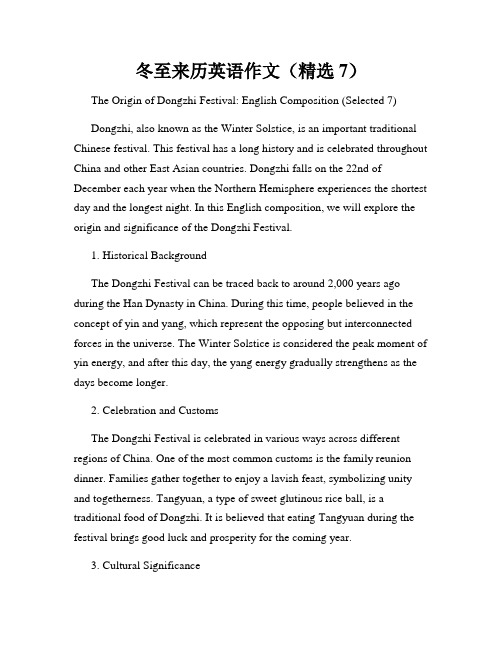
冬至来历英语作文(精选7)The Origin of Dongzhi Festival: English Composition (Selected 7)Dongzhi, also known as the Winter Solstice, is an important traditional Chinese festival. This festival has a long history and is celebrated throughout China and other East Asian countries. Dongzhi falls on the 22nd of December each year when the Northern Hemisphere experiences the shortest day and the longest night. In this English composition, we will explore the origin and significance of the Dongzhi Festival.1. Historical BackgroundThe Dongzhi Festival can be traced back to around 2,000 years ago during the Han Dynasty in China. During this time, people believed in the concept of yin and yang, which represent the opposing but interconnected forces in the universe. The Winter Solstice is considered the peak moment of yin energy, and after this day, the yang energy gradually strengthens as the days become longer.2. Celebration and CustomsThe Dongzhi Festival is celebrated in various ways across different regions of China. One of the most common customs is the family reunion dinner. Families gather together to enjoy a lavish feast, symbolizing unity and togetherness. Tangyuan, a type of sweet glutinous rice ball, is a traditional food of Dongzhi. It is believed that eating Tangyuan during the festival brings good luck and prosperity for the coming year.3. Cultural SignificanceThe Dongzhi Festival holds great cultural significance in Chinese tradition. It is not only a time for family reunion but also a symbol of harmony and balance in life. The festival emphasizes the importance of cherishing family bonds and shows gratitude for the year's abundance while preparing for the new year ahead.4. Dongzhi in Chinese PoetryThroughout history, Dongzhi has been celebrated in Chinese poetry. Many renowned poets, such as Su Shi and Wang Anshi from the Song Dynasty, have depicted the beauty and emotions surrounding the festival in their works. These poems capture the essence of the Dongzhi Festival, portraying the joy of reunion and the hope for the coming year.5. Dongzhi Around the WorldAlthough the Dongzhi Festival originated in China, its influence has spread to other East Asian countries, including Japan, Korea, and Vietnam. In these countries, similar celebrations take place, highlighting the cultural similarities and shared values among these nations.6. Modern CelebrationsIn contemporary China, the Dongzhi Festival is still widely celebrated. However, due to changes in lifestyle and society, the way the festival is observed has evolved. Now, families may opt for dining out instead of preparing a feast at home. Nevertheless, the spirit of family reunion and appreciating the balance of yin and yang remains central to the celebrations.7. ConclusionIn conclusion, the Dongzhi Festival, also known as the Winter Solstice, has a rich history and cultural significance in Chinese tradition. This festival serves as a reminder to cherish family bonds, express gratitude, and embrace balance in life. As the Winter Solstice marks the arrival of longer days, it brings hope and anticipation for the coming year. Let us celebrate Dongzhi together, embracing the warmth and joy of family and the spirit of this important festival.Please note that the above composition contains 476 words. Should you need further expansion, please provide additional instructions.。
冬至的来历和风俗英文版
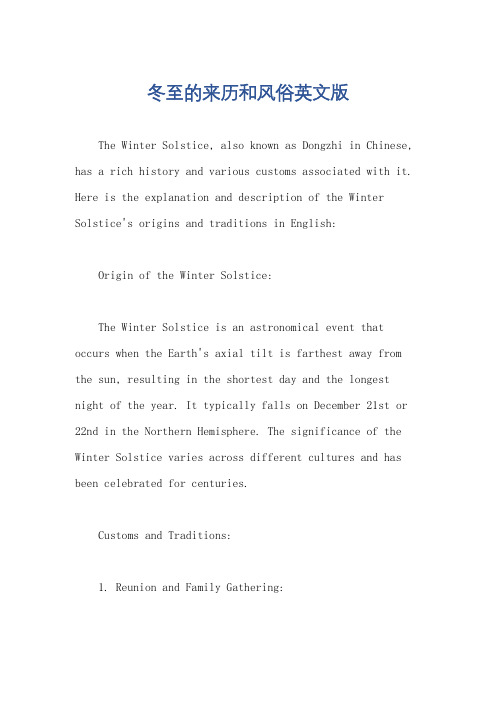
冬至的来历和风俗英文版The Winter Solstice, also known as Dongzhi in Chinese, has a rich history and various customs associated with it. Here is the explanation and description of the Winter Solstice's origins and traditions in English:Origin of the Winter Solstice:The Winter Solstice is an astronomical event that occurs when the Earth's axial tilt is farthest away from the sun, resulting in the shortest day and the longest night of the year. It typically falls on December 21st or 22nd in the Northern Hemisphere. The significance of the Winter Solstice varies across different cultures and has been celebrated for centuries.Customs and Traditions:1. Reunion and Family Gathering:The Winter Solstice is considered a time for family reunion in many cultures. People travel long distances to be with their loved ones, sharing meals and enjoying each other's company. It symbolizes the importance of family unity and harmony.2. Eating Tangyuan or Glutinous Rice Balls:In Chinese tradition, eating tangyuan or glutinous rice balls is a popular custom during the Winter Solstice. These round and sweet dumplings symbolize reunion and completeness. They are typically served in a warm and sweet soup, representing warmth and good fortune for the coming year.3. Lighting of Candles and Bonfires:In some cultures, lighting candles or bonfires is a customary practice during the Winter Solstice. It is believed that the light helps to ward off evil spirits and bring warmth and light into the darkness of the long night.4. Honoring Ancestors:During the Winter Solstice, many cultures pay respect to their ancestors and deceased loved ones. People visit ancestral gravesites, clean the tombstones, and offer food and other offerings as a way to honor and remember their ancestors.5. Celebration of Yule:In ancient European pagan traditions, the Winter Solstice is celebrated as Yule. It marks the rebirth of the sun and the beginning of longer days. Yule logs are burned, and feasts are held to celebrate the return of light and the promise of new beginnings.6. Reflection and Renewal:The Winter Solstice is often seen as a time for introspection and reflection. It is an opportunity to let go of the old and embrace the new. Many people set intentions and make resolutions for personal growth andpositive change in the upcoming year.7. Festivals and Cultural Events:Various festivals and cultural events are organized around the world to celebrate the Winter Solstice. These events often include music, dance performances, storytelling, and traditional rituals that highlight the significance of the solstice in different cultures.In conclusion, the Winter Solstice is a significant event celebrated worldwide with diverse customs and traditions. It is a time for family reunion, reflection, and renewal, as well as a celebration of light and the promise of new beginnings.。
冬至的由来英语版及内中文翻译
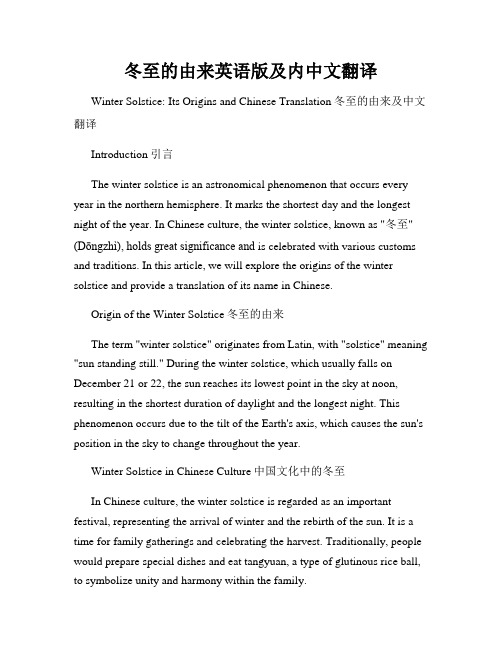
冬至的由来英语版及内中文翻译Winter Solstice: Its Origins and Chinese Translation冬至的由来及中文翻译Introduction引言The winter solstice is an astronomical phenomenon that occurs every year in the northern hemisphere. It marks the shortest day and the longest night of the year. In Chinese culture, the winter solstice, known as "冬至" (Dōngzhì), holds great significance and is celebrated with various customs and traditions. In this article, we will explore the origins of the winter solstice and provide a translation of its name in Chinese.Origin of the Winter Solstice冬至的由来The term "winter solstice" originates from Latin, with "solstice" meaning "sun standing still." During the winter solstice, which usually falls on December 21 or 22, the sun reaches its lowest point in the sky at noon, resulting in the shortest duration of daylight and the longest night. This phenomenon occurs due to the tilt of the Earth's axis, which causes the sun's position in the sky to change throughout the year.Winter Solstice in Chinese Culture中国文化中的冬至In Chinese culture, the winter solstice is regarded as an important festival, representing the arrival of winter and the rebirth of the sun. It is a time for family gatherings and celebrating the harvest. Traditionally, people would prepare special dishes and eat tangyuan, a type of glutinous rice ball, to symbolize unity and harmony within the family.The winter solstice is also associated with the concept of yin and yang in Chinese philosophy. Yin represents darkness and cold, while yang represents light and warmth. The winter solstice symbolizes the balance between these opposing forces, as it marks the turning point when yin energy begins to wane, and yang energy starts to grow. As such, it is considered an auspicious time for rejuvenation and a fresh start.Chinese Translation中国翻译The winter solstice is translated as "冬至" (Dōngzhì) in Chinese. The character "冬" (Dōng) means "winter," and "至" (Zhì) can be translated as "arrive" or "reaching." Therefore, the term "冬至" represents the arrival of winter and the significance of this astronomical event.Conclusion结论The winter solstice, a celestial event that occurs annually, holds great cultural importance in Chinese society. It is a time for family, reflection, and renewal as the days gradually become longer and the darkness of winter gives way to the promise of spring. "冬至" (Dōngzhì), the Chinese translation of the winter solstice, encapsulates the essence of this special time. Let us embrace and appreciate the significance of this festival, both in English and Chinese.。
冬至来历英语作文
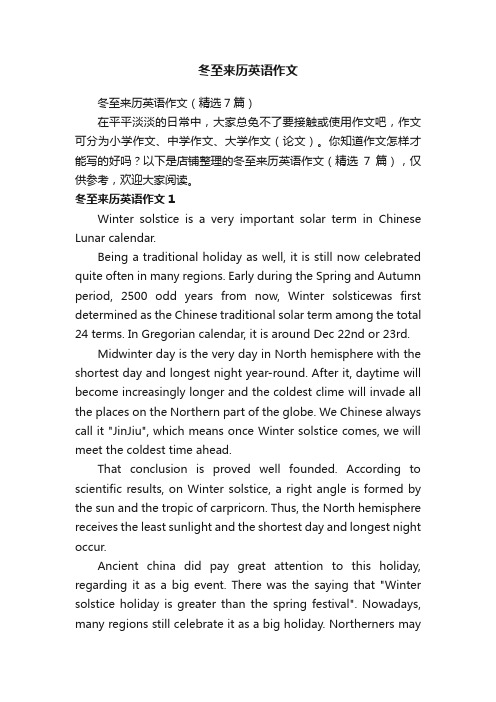
冬至来历英语作文冬至来历英语作文(精选7篇)在平平淡淡的日常中,大家总免不了要接触或使用作文吧,作文可分为小学作文、中学作文、大学作文(论文)。
你知道作文怎样才能写的好吗?以下是店铺整理的冬至来历英语作文(精选7篇),仅供参考,欢迎大家阅读。
冬至来历英语作文1Winter solstice is a very important solar term in Chinese Lunar calendar.Being a traditional holiday as well, it is still now celebrated quite often in many regions. Early during the Spring and Autumn period, 2500 odd years from now, Winter solsticewas first determined as the Chinese traditional solar term among the total 24 terms. In Gregorian calendar, it is around Dec 22nd or 23rd.Midwinter day is the very day in North hemisphere with the shortest day and longest night year-round. After it, daytime will become increasingly longer and the coldest clime will invade all the places on the Northern part of the globe. We Chinese always call it "JinJiu", which means once Winter solstice comes, we will meet the coldest time ahead.That conclusion is proved well founded. According to scientific results, on Winter solstice, a right angle is formed by the sun and the tropic of carpricorn. Thus, the North hemisphere receives the least sunlight and the shortest day and longest night occur.Ancient china did pay great attention to this holiday, regarding it as a big event. There was the saying that "Winter solstice holiday is greater than the spring festival". Nowadays, many regions still celebrate it as a big holiday. Northerners mayhave dumplings and raviolis that day while southerners may have dumplings made by rice and long noodles. Some places even have the tradition to offer sacrifices to the heaven and earth.冬至来历英语作文2Winter is coming, when it comes to the traditional festival is my favorite, I cannot hide the excitement of the heart. Winter solstice can make dumplings, eating dumplings, it makes me feel the winter solstice is the most happy.Once in the winter solstice, my mother and I are ready to make dumplings materials: some meat, some of the wrappers. I picked up a piece of the wrappers on the left hand, right hand dug a little fresh, use chopsticks to dumplings lining. But fresh meat seems very lively, leap to jump, very not easy sealing top results open again... Making dumplings is really not easy!Speak of the winter solstice eat dumplings, there is also a custom! In my hometown - the north of henan province, the winter solstice every family tradition is to make dumplings, eating dumplings. As the saying goes: "the winter solstice misconduct dumplings bowl, frozen off ears is nobodys business."The custom of the northern winter eat dumplings is due to the memory of "the medical sage" zhang zhongjing winter solstice medicine left. Hungry people eat dumplings, to drink the "remove cold soup", and warm, fever, two ears frostbite ears were cured.No matter you have the habit of eating dumplings, wish everyone happy winter solstice, happily and family spent together the happy holiday!冬至来历英语作文3As early as 2,500 years ago, about the Spring and AutumnPeriod (770-476 BC), China had determined the point of Winter Solstice by observing movements of the sun with a sundial. It is the earliest of the 24 seasonal division points. The time will be each December 22 or 23 according to the Gregorian calendar.The Northern hemisphere on this day experiences the shortest daytime and longest nighttime. After the Winter Solstice, days will benete longer and longer. As ancient Chinese thought, the yang, or muscular, positive things will benete stronger and stronger after this day, so it should be celebrated.The Winter Solstice became a festival during the Han Dynasty (206 BC-220 AD) and thrived in the Tang and Song dynasties (618-1279). The Han people regarded Winter Solstice as a "Winter Festival", so officials would organize celebrating activities. On this day, both officials and netmon people would have a rest. The army was stationed in, frontier fortresses closed and business and traveling stopped. Relatives and friends presented to each other delicious food. In the Tang and Song dynasties, the Winter Solstice was a day to offer scarifies to Heaven and ancestors. Emperors would go to suburbs to worship the Heaven; while netmon people offered sacrifices to their deceased parents or other relatives. The Qing Dynasty (1644-1911) even had the record that "Winter Solstice is as formal as the Spring Festival," showing the great importance attached to this day.In some parts of Northern China, people eat dumpling soup on this day; while residents of some other places eat dumplings, saying doing so will keep them from frost in the upneting winter. But in parts of South China, the whole family will get together to have a meal made of red-bean and glutinous rice to drive away ghosts and other evil things. In other places, people also eat tangyuan, a kind of stuffed small dumpling ball made ofglutinous rice flour. The Winter Solstice rice dumplings could be used as sacrifices to ancestors, or gifts for friends and relatives. The Taiwan people even keep the custom of offering nine-layer cakes to their ancestors. They make cakes in the shape of chicken, duck, tortoise, pig, cow or sheep with glutinous rice flour and steam them on different layers of a pot. These animals all signify auspiciousness in Chinese tradition. People of the same surname or family clan gather at their ancestral temples to worship their ancestors in age order. After the sacrificial ceremony, there is always a grand banquet.冬至来历英语作文4On December 21st,2020,this day is the Winter Solstice,which is a very important festival in China and has become a tradition. As early as 2500 years ago,the Chinese had detected this day by observing the sun. Whats so special about this day?The answer is that on this day,the day lasts the shortest and the night lasts the longest of the year. It means the new round of the solar terms,the Winter Solstice is the earliest. As an old tradition,people treat that day a grand day,and they celebrate it. In the north,most people eat dumplings,while in the south,people eat sticky rice dumplings. Although people celebrate the day in different ways,they share the same joy and families get together to have a big dinner. The Winter Solstice gives family a chance to be reunited,and the young come home to have a chat with parents and promote their communication. This is the traditional Chinese Festival,the Winter Solstice.冬至来历英语作文5On December 22, 2013, the day is the Winter Solstice, it is an important day in China, it becomes a tradition. More than 2500years ago, Chinese people had detected this day bymeasuring the sun. What is special on the day? The answer is that the daytime lasts the shortest while the night lasts the longest of the year. It means the new round of the solar term, the Winter Solstice is the earliest.As an old tradition, people treat that day a grand day, they celebrate it. In the north, most people eat dumplings, while in the south, people have rice dumpling and boiled dumpling. Though people celebrate in a different way, they share the same happiness, family get together and have a big dinner. Winter Solstice gives family a chance to get reunion, the young come home to have a chat with parents and promote their communication.冬至来历英语作文6Today is the winter solstice, mother said to eat dumplings, the winter solstice eat dumplings is a custom in my hometown, eaten in the morning my mother and I went to the supermarket to buy dumplings materials. Have eggs and leek, after buying food back home mother will not idle, and began to chop stuffing, then I go to school before mom, start with noodles. Because is the first time and, first of all, I poured a cup noodles into the pot, pour warm water and began to face to, looks good, but not as easy as imagined, less water, the face is too dry, it is much more water, and the surface is thinning, repeated several times to get the surface and good, but too much, and the face Im afraid we eat at noon, at this moment, moms dumpling stuffing also chop, we will work up and started to make dumplings.Dumplings in the teaching of the mother, like like like dont like all packages, finally to eat, my own package dumplings.Really is happy day!冬至来历英语作文7The winter solstice, the winter solstice as the "holiday" in han dynasty, the rulers to congratulate ceremony known as "He Dong", official holidays, routine officialdom popular each "winter" worship custom. "Were" has such records: "before and after the winter solstice, the gentleman place static body, baiguan, scenes, and then pick an auspicious day Chen save trouble." So on the court and off to rest, to the army on standby, frontier retreat, business travel out of business, family and all distinctions to food, visit each other, a joyous festival "place static body". When in the six dynasties, the winter solstice is called "the age", people to elders to extend holiday greetings to your parents; After the song dynasty, the winter solstice festival gradually become the sacrifice to ancestors and gods.Tang and song period, the winter solstice is to worship the day of worship ancestors, the emperor held outside the day to worship, the people in this day to the parents or elders worship. Ming and qing dynasties, the emperor have to worship, of "winter solstice jiao days". There has to be given to a emperor, table officials ritual, but also to each other for congratulations, like New Years day.Winter festival also called yesterday, hand in winter. It is one of the 24 solar terms, is a traditional festival of China, have "the winter solstice as big as a year". Winter solstice supplements, is Chinas traditional customs, folksay: fill a lump-sum winter, in the coming year without pain. Summer volts, winter lump-sum. The winter solstice mend, nutrients.【冬至来历英语作文(精选7篇)】。
冬至的由来英语作文(通用8篇)
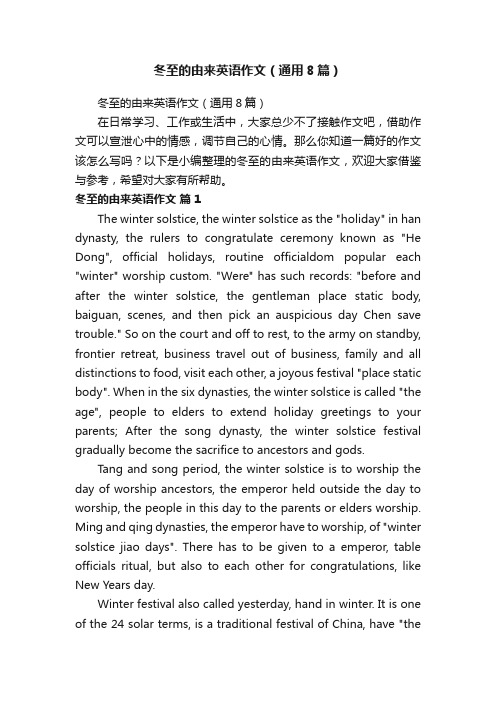
冬至的由来英语作文(通用8篇)冬至的由来英语作文(通用8篇)在日常学习、工作或生活中,大家总少不了接触作文吧,借助作文可以宣泄心中的情感,调节自己的心情。
那么你知道一篇好的作文该怎么写吗?以下是小编整理的冬至的由来英语作文,欢迎大家借鉴与参考,希望对大家有所帮助。
冬至的由来英语作文篇1The winter solstice, the winter solstice as the "holiday" in han dynasty, the rulers to congratulate ceremony known as "He Dong", official holidays, routine officialdom popular each "winter" worship custom. "Were" has such records: "before and after the winter solstice, the gentleman place static body, baiguan, scenes, and then pick an auspicious day Chen save trouble." So on the court and off to rest, to the army on standby, frontier retreat, business travel out of business, family and all distinctions to food, visit each other, a joyous festival "place static body". When in the six dynasties, the winter solstice is called "the age", people to elders to extend holiday greetings to your parents; After the song dynasty, the winter solstice festival gradually become the sacrifice to ancestors and gods.Tang and song period, the winter solstice is to worship the day of worship ancestors, the emperor held outside the day to worship, the people in this day to the parents or elders worship. Ming and qing dynasties, the emperor have to worship, of "winter solstice jiao days". There has to be given to a emperor, table officials ritual, but also to each other for congratulations, like New Years day.Winter festival also called yesterday, hand in winter. It is one of the 24 solar terms, is a traditional festival of China, have "thewinter solstice as big as a year". Winter solstice supplements, is Chinas traditional customs, folksay: fill a lump-sum winter, in the coming year without pain. Summer volts, winter lump-sum. The winter solstice mend, nutrients.冬至的由来英语作文篇2As early as 2,500 years ago, about the Spring and Autumn Period (770-476 BC), China had determined the point of Winter Solstice by observing movements of the sun with a sundial. It is the earliest of the 24 seasonal division points. The time will be each December 22 or 23 according to the Gregorian calendar.The Northern hemisphere on this day experiences the shortest daytime and longest nighttime. After the Winter Solstice, days will become longer and longer. As ancient Chinese thought, the yang, or muscular, positive things will become stronger and stronger after this day, so it should be celebrated.The Winter Solstice became a festival during the Han Dynasty (206 BC-220 AD) and thrived in the Tang and Song dynasties (618-1279). The Han people regarded Winter Solstice as a "Winter Festival", so officials would organize celebrating activities. On this day, both officials and common people would have a rest. The army was stationed in, frontier fortresses closed and business and traveling stopped. Relatives and friends presented to each other delicious food. In the Tang and Song dynasties, the Winter Solstice was a day to offer scarifies to Heaven and ancestors. Emperors would go to suburbs to worship the Heaven; while common people offered sacrifices to their deceased parents or other relatives. The Qing Dynasty (1644-1911) even had the record that "Winter Solstice is as formal as the Spring Festival," showing the great importance attached to this day.In some parts of Northern China, people eat dumpling soupon this day; while residents of some other places eat dumplings, saying doing so will keep them from frost in the upcoming winter. But in parts of South China, the whole family will get together to have a meal made of red-bean and glutinous rice to drive away ghosts and other evil things. In other places, people also eat tangyuan, a kind of stuffed small dumpling ball made of glutinous rice flour. The Winter Solstice rice dumplings could be used as sacrifices to ancestors, or gifts for friends and relatives. The Taiwan people even keep the custom of offering nine-layer cakes to their ancestors.They make cakes in the shape of chicken, duck, tortoise, pig, cow or sheep with glutinous rice flour and steam them on different layers of a pot. These animals all signify auspiciousness in Chinese tradition. People of the same surname or family clan gather at their ancestral temples to worship their ancestors in age order. After the sacrificial ceremony, there is always a grand banquet.冬至的由来英语作文篇3On December 22, 2013, the day is the Winter Solstice, it is an important day in China, it becomes a tradition. More than 2500years ago, Chinese people had detected this day by measuring the sun. What is special on the day? The answer is that the daytime lasts the shortest while the night lasts the longest of the year. It means the new round of the solar term, the Winter Solstice is the earliest.As an old tradition, people treat that day a grand day, they celebrate it. In the north, most people eat dumplings, while in the south, people have rice dumpling and boiled dumpling. Though people celebrate in a different way, they share the same happiness, family get together and have a big dinner. WinterSolstice gives family a chance to get reunion, the young come home to have a chat with parents and promote their communication.冬至的由来英语作文篇4Winter solstice is a very important solar term in Chinese Lunar calendar.Being a traditional holiday as well, it is still now celebrated quite often in many regions. Early during the Spring and Autumn period, 2500 odd years from now, Winter solsticewas first determined as the Chinese traditional solar term among the total 24 terms. In Gregorian calendar, it is around Dec 22nd or 23rd.Midwinter day is the very day in North hemisphere with the shortest day and longest night year-round. After it, daytime will become increasingly longer and the coldest clime will invade all the places on the Northern part of the globe. We Chinese always call it "JinJiu", which means once Winter solstice comes, we will meet the coldest time ahead.That conclusion is proved well founded. According to scientific results, on Winter solstice, a right angle is formed by the sun and the tropic of carpricorn. Thus, the North hemisphere receives the least sunlight and the shortest day and longest night occur.Ancient china did pay great attention to this holiday, regarding it as a big event. There was the saying that "Winter solstice holiday is greater than the spring festival". Nowadays, many regions still celebrate it as a big holiday. Northerners may have dumplings and raviolis that day while southerners may have dumplings made by rice and long noodles. Some places even have the tradition to offer sacrifices to the heaven and earth.冬至的由来英语作文篇5On December , 3, the day is the Winter Solstice, it is an important day in China, it becomes a tradition. More than 00years ago, Chinese people had detected this day by measuring the sun. What is special on the day? The answer is that the daytime lasts the shortest while the night lasts the longest of the year. It means the new round of the solar term, the Winter Solstice is the earliest.As an old tradition, people treat that day a grand day, they celebrate it. In the north, most people eat dumplings, while in the south, people have rice dumpling and boiled dumpling. Though people celebrate in a different way, they share the same happiness, family get together and have a big dinner. Winter Solstice gives family a chance to get reunion, the young come home to have a chat with parents and promote their communication.冬至的由来英语作文篇6Winter is coming, when it comes to the traditional festival is my favorite, I cannot hide the excitement of the heart. Winter solstice can make dumplings, eating dumplings, it makes me feel the winter solstice is the most happy.Once in the winter solstice, my mother and I are ready to make dumplings materials: some meat, some of the wrappers. I picked up a piece of the wrappers on the left hand, right hand dug a little fresh, use chopsticks to dumplings lining. But fresh meat seems very lively, leap to jump, very not easy sealing top results open again... Making dumplings is really not easy!Speak of the winter solstice eat dumplings, there is also a custom! In my hometown - the north of henan province, the winter solstice every family tradition is to make dumplings, eating dumplings. As the saying goes: "the winter solsticemisconduct dumplings bowl, frozen off ears is nobodys business."The custom of the northern winter eat dumplings is due to the memory of "the medical sage" zhang zhongjing winter solstice medicine left. Hungry people eat dumplings, to drink the "remove cold soup", and warm, fever, two ears frostbite ears were cured.No matter you have the habit of eating dumplings, wish everyone happy winter solstice, happily and family spent together the happy holiday!冬至的由来英语作文篇7Today is the winter solstice, mother said to eat dumplings, the winter solstice eat dumplings is a custom in my hometown, eaten in the morning my mother and I went to the supermarket to buy dumplings materials. Have eggs and leek, after buying food back home mother will not idle, and began to chop stuffing, then I go to school before mom, start with noodles. Because is the first time and, first of all, I poured a cup noodles into the pot, pour warm water and began to face to, looks good, but not as easy as imagined, less water, the face is too dry, it is much more water, and the surface is thinning, repeated several times to get the surface and good, but too much, and the face Im afraid we eat at noon, at this moment, moms dumpling stuffing also chop, we will work up and started to make dumplings.Dumplings in the teaching of the mother, like like like dont like all packages, finally to eat, my own package dumplings.Really is happy day!今天是冬至,妈妈说要吃饺子,冬至吃饺子是我家乡的风俗,早上吃过饭妈妈和我就去超市买包饺子用的材料。
冬至的英语作文(通用7)
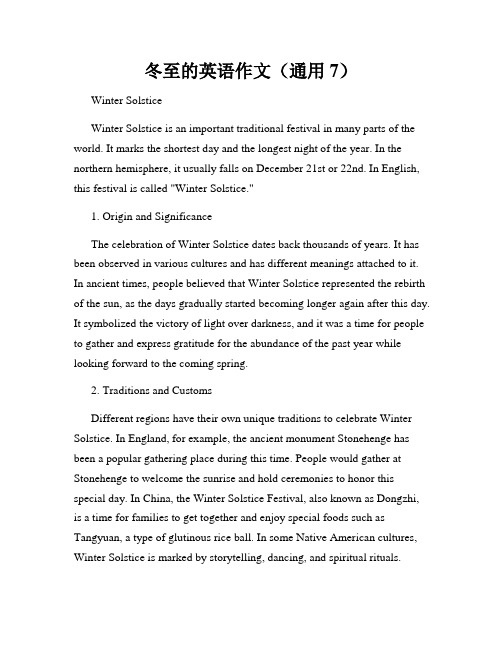
冬至的英语作文(通用7)Winter SolsticeWinter Solstice is an important traditional festival in many parts of the world. It marks the shortest day and the longest night of the year. In the northern hemisphere, it usually falls on December 21st or 22nd. In English, this festival is called "Winter Solstice."1. Origin and SignificanceThe celebration of Winter Solstice dates back thousands of years. It has been observed in various cultures and has different meanings attached to it. In ancient times, people believed that Winter Solstice represented the rebirth of the sun, as the days gradually started becoming longer again after this day. It symbolized the victory of light over darkness, and it was a time for people to gather and express gratitude for the abundance of the past year while looking forward to the coming spring.2. Traditions and CustomsDifferent regions have their own unique traditions to celebrate Winter Solstice. In England, for example, the ancient monument Stonehenge has been a popular gathering place during this time. People would gather at Stonehenge to welcome the sunrise and hold ceremonies to honor this special day. In China, the Winter Solstice Festival, also known as Dongzhi, is a time for families to get together and enjoy special foods such as Tangyuan, a type of glutinous rice ball. In some Native American cultures, Winter Solstice is marked by storytelling, dancing, and spiritual rituals.3. Festive FoodsIn addition to the cultural and traditional aspect, Winter Solstice celebrations are often associated with special foods. These foods are often prepared to bring warmth and good luck during the cold winter months. For example, in addition to Tangyuan, people in some Western cultures may indulge in hearty stews, roasted meat, or hot drinks like mulled wine or hot chocolate. In Scandinavia, a popular treat during this time is the St. Lucia Bun, a sweet saffron bun. In essence, Winter Solstice is a time for people to gather and share heartwarming meals with loved ones.4. Global CelebrationsWinter Solstice is celebrated in many countries around the world, each with its own unique customs and traditions. For example, in Japan, the Winter Solstice is known as "Toji" and is often celebrated by taking a warm bath with Yuzu citrus fruits to help ward off colds. In Sweden, there is a festival called "Lucia" on December 13th, which is associated with the darkest time of the year and features a procession of people wearing white robes and candles. These global celebrations reflect the diversity and richness of cultural traditions around the world.5. Reflection and RenewalAs the year approaches its darkest point, Winter Solstice provides an opportunity for reflection and renewal. It is a time to gather with loved ones, express gratitude, and set intentions for the year ahead. Just as the sun begins its journey towards longer days, we too can use this time to ignite our own inner light and embrace the potential for growth and transformation.In conclusion, Winter Solstice holds great significance in cultures worldwide. It is a time of celebration, reflection, and renewal. Whether through special customs, festive foods, or lively gatherings, Winter Solstice brings people together to honor the cycle of seasons and appreciate the warmth and light that surrounds us even during the coldest months of the year. Let us embrace the spirit of Winter Solstice and cherish the connections we share with others as we welcome the return of the sun's warm embrace.。
关于冬至由来的演讲稿英语
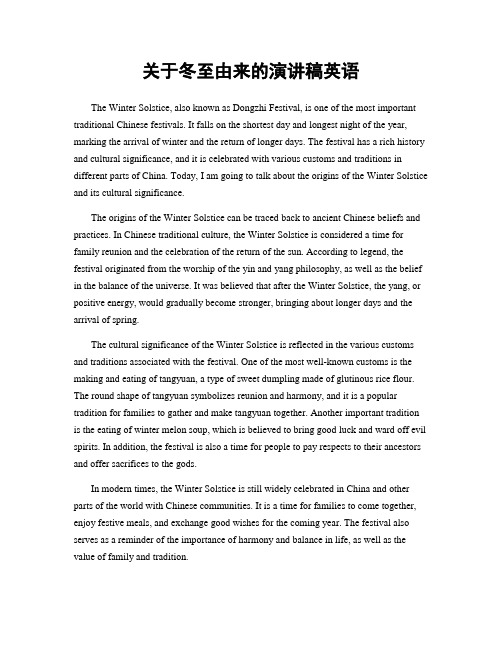
关于冬至由来的演讲稿英语The Winter Solstice, also known as Dongzhi Festival, is one of the most important traditional Chinese festivals. It falls on the shortest day and longest night of the year, marking the arrival of winter and the return of longer days. The festival has a rich history and cultural significance, and it is celebrated with various customs and traditions in different parts of China. Today, I am going to talk about the origins of the Winter Solstice and its cultural significance.The origins of the Winter Solstice can be traced back to ancient Chinese beliefs and practices. In Chinese traditional culture, the Winter Solstice is considered a time for family reunion and the celebration of the return of the sun. According to legend, the festival originated from the worship of the yin and yang philosophy, as well as the belief in the balance of the universe. It was believed that after the Winter Solstice, the yang, or positive energy, would gradually become stronger, bringing about longer days and the arrival of spring.The cultural significance of the Winter Solstice is reflected in the various customs and traditions associated with the festival. One of the most well-known customs is the making and eating of tangyuan, a type of sweet dumpling made of glutinous rice flour. The round shape of tangyuan symbolizes reunion and harmony, and it is a popular tradition for families to gather and make tangyuan together. Another important tradition is the eating of winter melon soup, which is believed to bring good luck and ward off evil spirits. In addition, the festival is also a time for people to pay respects to their ancestors and offer sacrifices to the gods.In modern times, the Winter Solstice is still widely celebrated in China and other parts of the world with Chinese communities. It is a time for families to come together, enjoy festive meals, and exchange good wishes for the coming year. The festival also serves as a reminder of the importance of harmony and balance in life, as well as the value of family and tradition.In conclusion, the Winter Solstice has deep roots in Chinese culture and holds significant cultural and historical importance. It is a time for people to reflect on the changing of the seasons, celebrate the return of the sun, and cherish the warmth of family and tradition. As we gather to celebrate the Winter Solstice, let us remember the rich heritage and cultural significance of this special festival. Thank you.。
有关冬至的传说作文英语
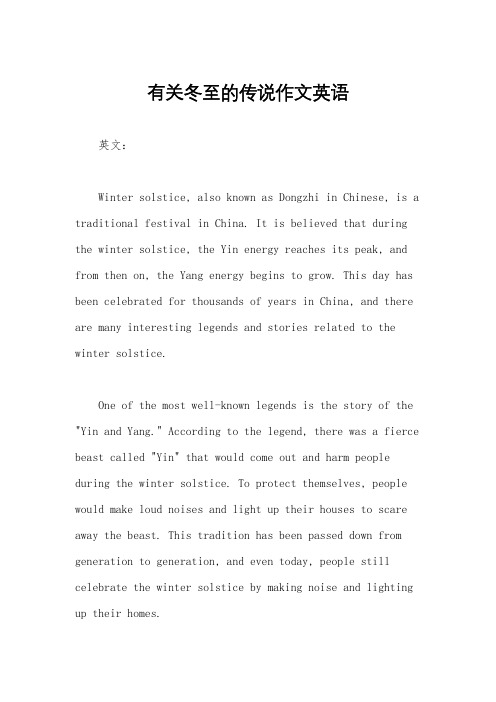
有关冬至的传说作文英语英文:Winter solstice, also known as Dongzhi in Chinese, is a traditional festival in China. It is believed that during the winter solstice, the Yin energy reaches its peak, and from then on, the Yang energy begins to grow. This day has been celebrated for thousands of years in China, and there are many interesting legends and stories related to the winter solstice.One of the most well-known legends is the story of the "Yin and Yang." According to the legend, there was a fierce beast called "Yin" that would come out and harm people during the winter solstice. To protect themselves, people would make loud noises and light up their houses to scare away the beast. This tradition has been passed down from generation to generation, and even today, people still celebrate the winter solstice by making noise and lighting up their homes.Another popular legend is the story of "Tangyuan." It is said that during the winter solstice, a beautiful fairy named "Tangyuan" would descend to the mortal world to bless people with good fortune. To show their respect, people would make and eat a special kind of sweet dumpling called "Tangyuan." This tradition has become a symbol of reunion and good luck, and it is still widely practiced in China.In addition to these legends, there are also many customs and activities associated with the winter solstice. For example, families would gather together to make and eat dumplings, which symbolize reunion and prosperity. People also eat glutinous rice balls to symbolize the coming together of family and friends. In some regions, people would also take a bath with special herbs to cleanse their bodies and ward off evil spirits.中文:冬至,也称为“冬至”,是中国的一个传统节日。
- 1、下载文档前请自行甄别文档内容的完整性,平台不提供额外的编辑、内容补充、找答案等附加服务。
- 2、"仅部分预览"的文档,不可在线预览部分如存在完整性等问题,可反馈申请退款(可完整预览的文档不适用该条件!)。
- 3、如文档侵犯您的权益,请联系客服反馈,我们会尽快为您处理(人工客服工作时间:9:00-18:30)。
冬至的由来英语作文
2020-08-11
在平凡的学习、工作、生活中,大家对都不陌生吧,作文是人们以书面形式表情达意的言语活动。
作文的注意事项有许多,你确定会写吗?以下是小编帮大家整理的冬至的由来英语作文,欢迎大家分享。
The winter solstice, the winter solstice as the "holiday" in han dynasty, the rulers to congratulate ceremony known as "He Dong", official holidays, routine officialdom popular each "winter" worship custom. "Were" has such records: "before and after the winter solstice, the gentleman place static body, baiguan, scenes, and then pick an auspicious day Chen save trouble." So on the court and off to rest, to the army on standby, frontier retreat, business travel out of business, family and all distinctions to food, visit each other, a joyous festival "place static body". When in the six dynasties, the winter solstice is called "the age", people to elders to extend holiday greetings to your parents; After the song dynasty, the winter solstice festival gradually become the sacrifice to ancestors and gods.
Tang and song period, the winter solstice is to worship the day of worship ancestors, the emperor held outside the day to worship, the people in this day to the parents or elders worship. Ming and qing dynasties, the emperor have to worship, of "winter solstice jiao days". There has to be given to a emperor, table officials ritual, but also to each other for congratulations, like New Year's day.
Winter festival also called yesterday, hand in winter. It is one of the 24 solar terms, is a traditional festival of China, have "the winter solstice as big as a year". Winter solstice supplements, is China's traditional customs, folksay: fill a lump-sum winter, in the coming year without pain. Summer volts, winter lump-sum. The winter solstice mend, nutrients.
冬至到了,汉代以冬至为“冬节”,官府要举行祝贺仪式称为“贺冬”,官方例行放假,官场流行互贺的“拜冬”礼俗。
《后汉书》中有这样的记载:“冬至前后,君子安身静体,百官绝事,不听政,择吉辰而后省事。
”所以这天朝廷上下要放假休息,军队待命,边塞闭关,商旅停业,亲朋各以美食相赠,相互拜访,欢乐地过一个“安身静体”的节日。
魏晋六朝时,冬至称为“亚岁”,民众要向父母长辈拜节;宋朝以后,冬至逐渐成为祭祀祖先和神灵的节庆活动。
唐、宋时期,冬至是祭天祀祖的日子,皇帝在这天要到郊外举行祭天大典,百姓在这一天要向父母尊长祭拜。
明、清两代,皇帝均有祭天大典,谓之“冬至郊天”。
宫内有百官向皇帝呈递贺表的仪式,而且还要互相投刺祝贺,就像元旦一样。
冬至节亦称冬节、交冬。
它既是二十四节气之一,是中国的一个传统节日,曾有“冬至大如年”的说法。
冬至进补,是我国传统风俗,俗语云:三九补一冬,来年无病痛。
夏养三伏,冬补三九。
冬至补一补,一年精气足。
